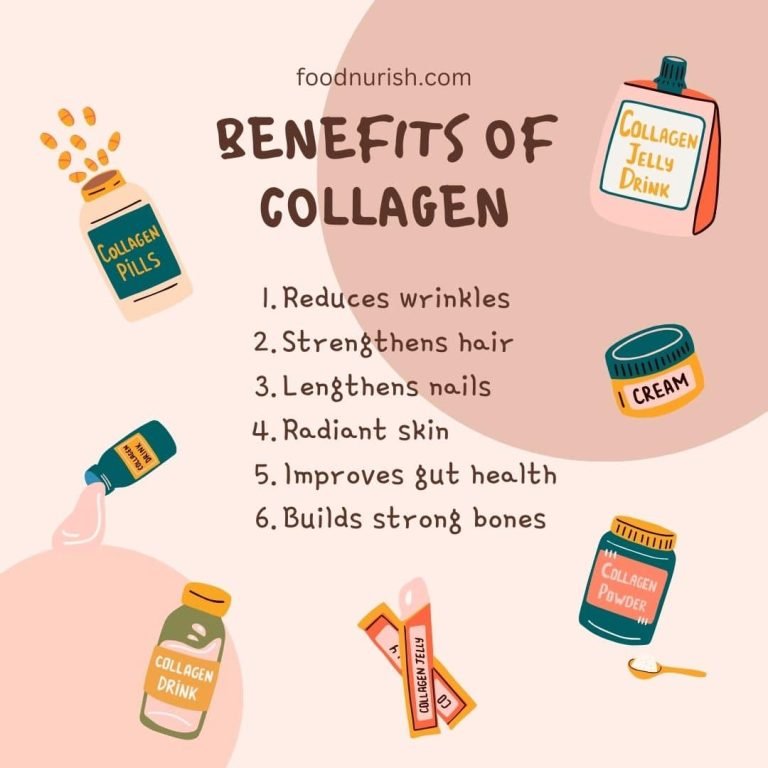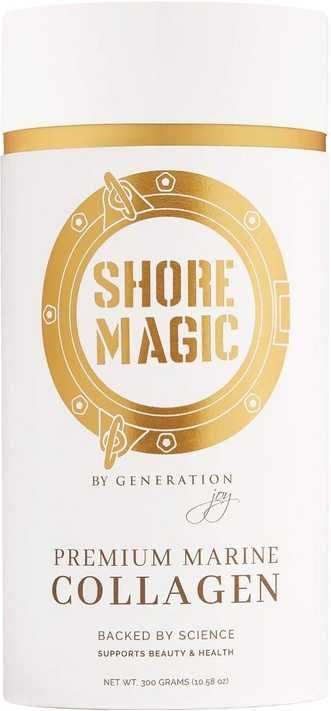Collagen Benefits, Foods, Supplements, Side Effects

You’ve probably heard about collagen and the role it plays in maintaining healthy skin, hair, nails, and joints.
But what exactly is collagen, and how does it affect your overall health and wellbeing? In this article, you’ll learn about the different types of collagen, the key collagen benefits, natural sources of collagen, collagen supplements, potential side effects, and how to boost collagen production naturally.
Let’s unlock the mystery of collagen and discover how it can enhance your health and wellbeing.
What is collagen and its role in the body
Collagen is the most abundant protein in your body, making up about 30% of all proteins. [1]
It’s a vital component of many tissues, including skin, bones, cartilage, tendons, ligaments, and blood vessels.
Collagen provides strength, flexibility, and elasticity to these tissues, ensuring they function correctly.
The word “collagen” comes from the Greek word “kolla,” which means glue. This is because collagen acts as a glue that holds your body together.
As you age, your body produces less collagen, leading to weaker and less elastic skin, brittle nails, thinning hair, and stiff joints.
Consequently, it’s essential to ensure you’re consuming enough collagen to maintain your health and wellbeing.

The different types of collagen
There are at least 28 different types of collagen, but the most common are types I, II, and III. Each type has specific functions and is found in various tissues throughout the body. [2]
- Type I Collagen: This is the most abundant collagen in your body and is found in skin, bones, tendons, and ligaments. Type I collagen provides structural support and strength to these tissues.
- Type II Collagen: Predominantly found in cartilage, type II collagen is essential for maintaining joint health and flexibility. It acts as a cushion between bones, preventing them from rubbing together and causing pain.
- Type III Collagen: This type is found in skin, blood vessels, and internal organs. It helps maintain the elasticity and flexibility of these tissues.
- Type IV Collagen: This type of collagen is found in respiratory tract tissue, intestines, tissue around the heart, and digestive system tissue. It helps to maintain the structure and function of these organs and tissues.
- Type V Collagen: Type V collagen is found in hair and cell surfaces. It is involved in the formation of hair and helps to maintain the integrity of our cell membranes.
Understanding the different types of collagen is essential, as each type plays a unique role in maintaining your health and wellbeing.
Collagen benefits for health and wellbeing
Collagen plays a crucial role in your overall health and wellbeing. Here are some of the key collagen benefits:
1. Improved skin health: Collagen is responsible for giving your skin its strength, elasticity, and youthful appearance. As you age, collagen production decreases, resulting in wrinkles, sagging skin, and fine lines. Increasing your collagen intake can help improve skin elasticity, hydration, and reduce the signs of aging.

2. Stronger nails and hair: Collagen is a significant component of your nails and hair. It helps keep your nails strong and less prone to breakage and promotes healthy hair growth.
3. Joint health and flexibility: Collagen acts as a “cushion” between your bones, reducing friction and allowing smooth movement. As collagen decreases with age, your joints can become stiff and painful. Consuming more collagen can help maintain joint health and flexibility.
4. Bone health: Collagen makes up a large portion of your bones, giving them the necessary strength and structure. With age, bone density decreases, increasing the risk of fractures and osteoporosis. Collagen supplementation has been shown to help improve bone density and strength.
5. Muscle mass: Collagen is also a critical component of your muscles, helping maintain their strength and function. Studies have shown that collagen supplementation can help increase muscle mass and strength, particularly in older adults.

Natural sources of collagen: Collagen-rich foods
Collagen is primarily derived from animal sources, with some of the best collagen-rich foods being:
1. Bone broth: Made by simmering animal bones in water for an extended period, bone broth is a rich source of collagen and other nutrients. Consuming bone broth regularly can help increase your collagen intake and improve your overall health.
2. Fish and shellfish: Fish, particularly their skin and bones, are high in collagen. Shellfish like shrimp and crab also contain significant amounts of collagen.
3. Chicken: Chicken is another excellent source of collagen, particularly the skin and connective tissues.
4. Egg whites: While not as high in collagen as other animal sources, egg whites still contain a small amount of collagen and can contribute to your overall intake.
5. Gelatin: Derived from collagen, gelatin is found in foods like jelly and marshmallows. It can also be used as a supplement to increase your collagen intake.
While there are no plant-based sources of collagen, consuming a diet rich in fruits, vegetables, and whole grains can help support collagen production by providing essential nutrients like vitamin C, zinc, and copper.
Here’s table with the top 10 collagen food sources per 100 grams.
| Food Name | Amount of Collagen per 100g | RDA Percentage |
|---|---|---|
| Beef | 18.9g | 63% |
| Pork Skin | 6.5g | 22% |
| Chicken | 3.6g | 12% |
| Fish | 2.0g | 7% |
| Egg Whites | 1.5g | 5% |
| Beans | 0.8g | 3% |
| Cheese | 0.3g | 1% |
| Avocado | 0.1g | 0% |
| Garlic | 0.1g | 0% |
| Berries | 0.1g | 0% |
It’s important to note that the RDA percentage is based on the recommended daily intake of protein, rather than collagen specifically. Additionally, the amount of collagen in foods can vary depending on factors such as the animal’s age and diet, as well as the cooking method used.
Collagen supplements: Types and how to choose the right one
If you’re looking to boost your collagen intake, supplements are a convenient and effective option.
There are various types of collagen supplements available, including powders, capsules, and gummies.
Here’s how to choose the right one for you:
1. Type of collagen: Ensure the supplement contains the type of collagen you’re looking for, whether it’s type I, II, or III. Some supplements contain a blend of multiple types for maximum benefits.
2. Source: Look for supplements derived from high-quality, sustainable sources, such as grass-fed, pasture-raised animals, or wild-caught fish.
3. Hydrolyzed collagen: Hydrolyzed collagen, also known as collagen peptides, is broken down into smaller molecules, making it easier for your body to absorb and use.
4. Additional ingredients: Some collagen supplements contain added vitamins, minerals, or other nutrients to enhance their benefits. Ensure the added ingredients align with your health goals and dietary needs.
5. Brand reputation: Choose a reputable brand that uses high-quality ingredients and follows good manufacturing practices.
As with any supplement, it’s essential to consult with your healthcare provider before starting a collagen supplement, particularly if you have any underlying health conditions or are pregnant or breastfeeding.
Here are some of the Best Collagen Supplements in the market right now:
Multi Collagen Complex Powder, 32 Ounces
- Micro Ingredients 7 in 1 full spectrum hydrolyzed collagen peptide powder.
- The ultimate anti-aging complex that offers up to 11g of pure pasture raised collagen peptides per serving.
- Created with premium hydrolyzed collagen for complete and efficient absorption that nourishes the hair, skin, nails, and joints.
⭐⭐⭐⭐⭐ | 4.4 (437 reviews)
Shore Magic Marine Fish Collagen Powder
This hydrolyzed collagen peptide powder is perfect for women looking to promote joint, nail, and hair health.
Made from wild-caught fish, it’s kosher and unflavored, making it easy to add to your daily routine.
⭐⭐⭐⭐⭐ | 4.8 (165 reviews)

Potential collagen side effects and precautions
While collagen is generally considered safe, some people may experience side effects or have concerns about consuming collagen. Here are some potential collagen side effects and precautions to consider:
- Allergies: Some people may have allergies to specific sources of collagen, such as fish or shellfish. If you have a known allergy, choose a collagen supplement derived from a different source.
- Digestive issues: Some people may experience mild digestive issues, such as bloating or gas, when first starting a collagen supplement. These side effects typically subside as your body adjusts to the supplement.
- Overconsumption: Consuming excessive amounts of collagen can lead to an imbalance in your amino acid intake, which can negatively impact your health. Stick to the recommended dosage on your collagen supplement to avoid potential issues.
- Interactions with medications: Collagen supplements may interact with certain medications, such as blood thinners. Consult with your healthcare provider before starting a collagen supplement if you’re taking any medications.
Boosting collagen production naturally
In addition to consuming collagen-rich foods and supplements, you can also support your body’s collagen production through specific lifestyle habits:
- Consume a nutrient-dense diet: Eating a well-balanced diet rich in fruits, vegetables, whole grains, and lean protein can provide your body with the necessary nutrients to support collagen production, such as vitamin C, zinc, and copper.
- Protect your skin from sun damage: Excessive sun exposure can damage your skin’s collagen and elastin, leading to premature aging. Protect your skin by wearing sunscreen, protective clothing, and seeking shade when necessary.
- Avoid smoking: Smoking can significantly reduce your body’s collagen production and damage your skin’s collagen and elastin fibers, leading to premature aging.
- Manage stress: Chronic stress can negatively impact your body’s collagen production. Prioritize stress management through activities like exercise, meditation, and spending time with loved ones.
- Get enough sleep: Your body produces collagen while you sleep, making it essential to prioritize quality sleep each night.
Collagen Bioavailability
Collagen is a protein that needs to be broken down into smaller peptides and amino acids in order to be effectively metabolized in the body. This process is called collagen digestion and it occurs in the digestive system.
In order for collagen to be effectively digested, it needs to be in a form that is easily broken down by digestive enzymes. This means that collagen supplements or foods that contain collagen should be hydrolyzed, which means that the collagen has been broken down into smaller peptides through a process called hydrolysis.
Additionally, collagen metabolism requires certain nutrients, such as vitamin C, which is necessary for the production of collagen in the body. Other nutrients that are important for collagen metabolism include copper, zinc, and manganese.
The role of collagen in skincare and beauty
Collagen is a popular ingredient in skincare and beauty products, thanks to its numerous benefits for skin health.
Topical collagen products, such as creams, serums, and masks, can help improve skin elasticity, hydration, and reduce the appearance of wrinkles and fine lines.
However, keep in mind that the molecules in topical collagen products are often too large to penetrate the skin’s surface effectively. [3]
This means that while they may provide some temporary benefits, they are unlikely to have a lasting impact on your skin’s collagen levels.
Instead, focus on consuming collagen-rich foods and supplements – as the ones mentioned above – as well as prioritizing the lifestyle habits mentioned above, to support your skin’s collagen production from within.
Conclusion: The importance of collagen for overall health
Collagen is a vital protein in your body, playing a crucial role in the health and function of your skin, hair, nails, joints, bones, and more.
By understanding what collagen is and incorporating collagen-rich foods and supplements into your diet, you can support your body’s collagen production and enjoy numerous health benefits.
Remember to prioritize a well-balanced diet, protect your skin from sun damage, avoid smoking, manage stress, and get enough sleep to promote collagen production naturally.
With a focus on collagen, you’ll be well on your way to improving your overall health and wellbeing.
Read Also:




